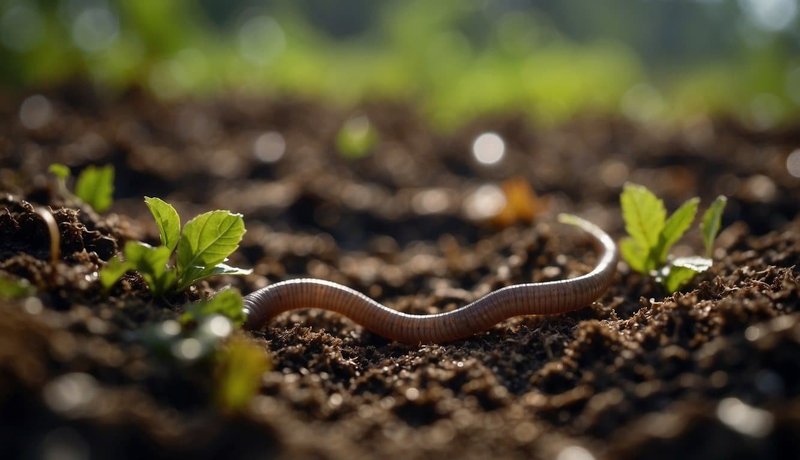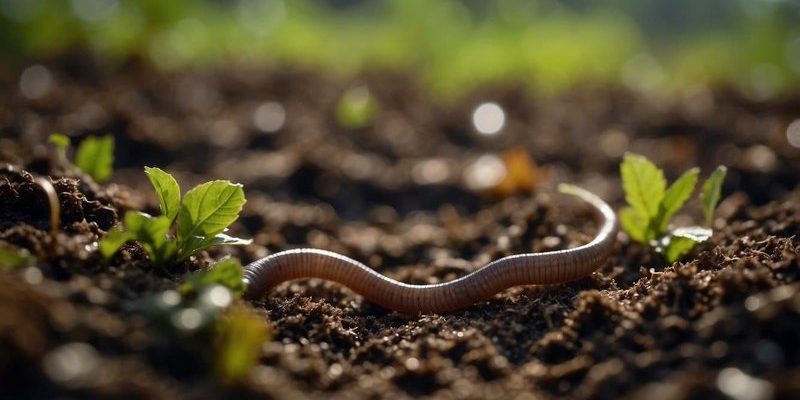
Let’s talk about a specific type of worm you might encounter in a worm bin: the red wiggler. These little wrigglers are often the stars of composting systems. They feast on kitchen scraps and transform waste into nutrient-rich compost. Their work not only helps reduce landfill waste but also breathes life into the soil. So, grab a cup of coffee and let’s dig into the fascinating world of worm bin worms and their importance!
What Are Worm Bin Worms?
Worm bin worms, particularly red wigglers (Eisenia fetida), are a type of earthworm specifically used for composting. These worms thrive in decaying organic matter, making them great companions for a home composting setup. Unlike common garden worms, red wigglers prefer the top layers of soil where organic material is abundant.
These little guys are not just about eating. They help aerate the soil as they move through it, creating channels for air and water to reach plant roots. Plus, their castings, or worm poop, are actually packed with nutrients, like nitrogen, phosphorus, and potassium. Think of it as nature’s miracle fertilizer!
One reason red wigglers are preferred in worm bins is their rapid reproduction rate. A single worm can produce dozens of offspring in just a few months. So, if you’re thinking about starting a worm bin, these worms are excellent for kick-starting your composting journey.
How Do Worms Contribute to Soil Health?
Worm bin worms play a critical role in maintaining soil health. Picture them as miniature gardeners, tirelessly working beneath our feet. As they consume organic matter, they break it down into smaller pieces, making it easier for bacteria and fungi to decompose even further. This process enriches the soil with humus, a key component that improves soil structure, water retention, and nutrient availability.
The castings produced by these worms are extremely beneficial. They enhance soil fertility and can even help in suppressing plant diseases. When you add worm castings to your garden, you’re essentially giving your plants a nutrient boost. It’s like sending them to a fancy restaurant instead of serving fast food!
Moreover, worms improve soil aeration. As they burrow through the soil, they create tunnels that allow air and water to infiltrate deeper layers. Healthy soil means healthy plants, and healthy plants mean a vibrant ecosystem surrounding them.
The Benefits of Worm Bins for Homeowners
Setting up a worm bin at home comes with so many benefits. First off, it’s an eco-friendly way to reduce food waste. Instead of tossing scraps in the trash, you can feed them to your worms. It’s like having your own little recycling system!
Another perk? You get rich compost for your garden or houseplants. The compost produced by your worm bin is often referred to as “black gold” by gardeners due to its impressive benefits for soil and plants. You might find you don’t need chemical fertilizers anymore—nature provides!
Plus, worm bins fit well in small spaces. Whether you live in a tiny apartment or a house with a small yard, a worm bin can be kept indoors or outdoors on a balcony. It’s a simple way to contribute to sustainability efforts right from your home.
The Role of Worms in Aquatic Ecosystems
While we often think about worms in the garden, they also play significant roles in aquatic ecosystems. Some species of worms, like aquatic worms, thrive in water bodies, breaking down organic matter just like their terrestrial cousins.
In ponds and lakes, these worms help decompose dead plants and animals, recycling nutrients back into the water. This decomposition process is essential for maintaining water quality and promoting a healthy ecosystem. When nutrients are recycled effectively, it supports fish populations and various aquatic plants, creating a balanced environment.
Interestingly, worm castings can also benefit aquatic plants when used as a fertilizer in water gardens. Just like their land-based relatives, these castings provide essential nutrients that help aquatic plants grow strong and vibrant.
Tips for Starting Your Own Worm Bin
Thinking about starting a worm bin? Here are some straightforward steps to get you going:
- Choose the right container: A simple plastic bin with a lid will work perfectly. Just make sure to drill holes for air circulation.
- Add bedding: Use shredded newspaper or cardboard, and moisten it before adding worms.
- Introduce the worms: Purchase red wigglers from a local garden store or online. They’ll be excited to join their new home!
- Feed them scraps: Give them kitchen scraps like fruit and vegetable peels, coffee grounds, and eggshells. Avoid meat, dairy, and oily foods.
- Maintain moisture: Keep the bedding damp but not soggy. You want it to feel like a wrung-out sponge.
As you tend to your worm bin, you’ll start to notice the magical transformation of kitchen scraps into rich, dark compost. It’s a slow process, but the rewards are worth every minute spent!
Common Myths About Worms in Composting
Despite their popularity, there are several myths surrounding worm composting. Let’s clear a few up:
1. Worms are smelly: When managed correctly, worm bins shouldn’t smell bad. If you’re noticing odors, it might be a sign of overfeeding or too much moisture.
2. You need special worms: While red wigglers are the best for composting, many types of worms can work in different systems. Do your research, but don’t be afraid to experiment!
3. They can’t survive indoors: Red wigglers can thrive in indoor environments! They adapt well as long as conditions are right—temperature, moisture, and food.
Understanding the truth behind these myths can help you become a more confident worm bin owner.
Worm bin worms, like red wigglers, are more than just squiggly creatures; they are vital members of both soil and aquatic ecosystems. They break down organic matter, enrich our gardens, and help maintain balanced environments in water bodies. Starting a worm bin can be a rewarding experience for anyone looking to reduce waste and contribute to a healthier planet.
So, why not give it a try? Embrace the worms, and you’ll be amazed at what these tiny gardeners can do for you and your environment. Plus, it feels good to know that you’re doing your bit for the earth, one worm at a time!

